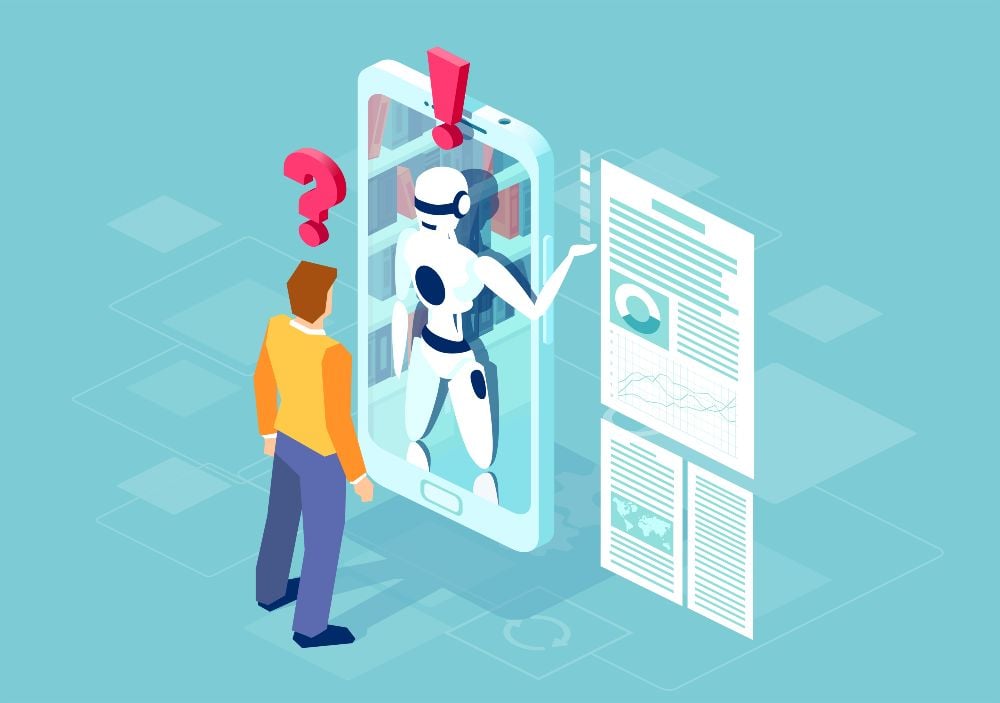Artificial Intelligence has officially taken the world by storm. In virtually every industry, companies are turning to AI as a way of augmenting their employees, improving processes, and boosting efficiency. According to reports, the global enterprise AI market is projected to reach a value of $53.06 billion by 2026, with a massive CAGR of 35.4%.
Artificial Intelligence essentially allows us to process and use data more effectively, unlocking new opportunities for growth and innovation. However, before companies can start leveraging the benefits of AI for themselves, they need to determine which avenue they’re going to explore.
Enterprise AI comes in a variety of different flavours, all focused on achieving specific outcomes and goals. If you’re planning on leveraging AI for the next stage of your digital transformation project, here are some of the common forms of intelligence you may want to look at.

Enterprise AI Type 1: Text AI

Text AI is probably one of the most common forms of artificial intelligence in the landscape today. It involves training and leveraging artificial intelligence with text and written content. Text AI can encompass everything from text recognition to speech to text conversion when machines automatically transcribe conversations or audio on your behalf.
Text AI can also include autocompleting functionality in search engines when a system uses context and historical data to predict what you might be about to type. Text AI also helps search systems to immediately find related text and information when you look for a specific word in a software tool.
Text analysis has become a little more popular in the age of chatbots and online messaging. Chatbots are taught how to recognise and respond to specific phrases and keywords using millions of pieces of historical, written data.
Also Read: Uber Files Leaked: How Info Hidden By Corporations And Politicians Breaches Data Ethics
Enterprise AI Type 2: Interactive AI

Building on the concept of “text AI” in chatbots, companies have begun to develop a more dynamic experience for today’s customers. Interactive AI solutions, like virtual assistants, don’t just respond to specific words and phrases. They can use things like conversational analytics and natural language processing to understand the context behind what a person is saying.
Interactive AI systems are capable of actually having conversations with people, and completing tasks on a human being’s behalf. For instance, an IVR system embedded with artificial intelligence could allow a customer to call a contact centre to request access to a specific member of staff, complete a purchase, or change something in their account.
Interactive AI allows us to connect with machines on a deeper level, leveraging the intelligence and features of machines to complete tasks. Even team members can use interactive AI to assist them with various things like searching for information or submitting reports.
Enterprise AI Type 3: Visual AI

Visual AI is similar to text AI in its focus on analysing and leveraging a specific kind of content. The concept of visual AI is built around “computer vision”. This is the ability of computers with machine learning and artificial intelligence technology to understand what’s going on in an image.
Concepts like optical character recognition and visual analysis allow businesses to scan, identify, and categorize visual objects. Visual AI can also help companies to generate useful insights from videos and photos. For instance, a security company could use a visual AI system embedded into a CCTV camera to immediately pinpoint the presence of a weapon in a room, and alert the authorities.
Training visual AI systems are similar to training text and other AI devices. Often, it requires companies to expose an algorithm to a huge number of images, to help the technology understand what individual elements of an image might represent.
Also Read: Meta’s Internal Memo: Employees Asked To Brace For ‘Serious Times’ Ahead
Enterprise AI Type 4: Analytical AI

Perhaps the most important form of enterprise AI for many businesses today, analytical AI involves using intelligence to gather insights from large amounts of data. Machines are far more adept at sorting through huge volumes of information and searching for patterns than human beings. With machine learning and deep neural networks, AI systems can spot patterns between data sets, highlight important trends, and offer useful insights.
Analytical AI can be used to access a wide range of useful insights in the enterprise landscape. You can use your analytics system to determine which of your products has the best revenue, or which days you have the highest number of service requests.
One increasingly appealing form of analytical AI is sentiment analysis, which involves asking AI to listen to a voice or read the text to examine the intent, emotion, and feeling behind a sentence. With sentiment analysis, companies can ensure they’re delivering an excellent customer experience.
Enterprise AI Type 5: Functional AI

Finally, functional AI is another area of intelligence capturing more attention in the age of digital transformation. The primary form of functional AI most companies will be familiar with is intelligent automation. With functional AI, companies can create systems capable of recognising specific triggers or events and responding in a certain way without human intervention.
For instance, if a sensor empowered by AI in your manufacturing facility detects an increase in temperature in a machine, it can automatically alert a technician, and implement cooling mechanisms. This reduces the risk of maintenance issues and downtime.
Functional AI solutions can be built to follow specific workflows and perform certain actions under unique circumstances. With functional AI, companies can reduce the number of repetitive tasks human employees need to work on each day, and improve the efficiency of the overall company. It’s even possible to proactively serve customers and reduce breakdowns this way.
The Rising Demand for Enterprise AI
Artificial Intelligence is rapidly becoming a must-have investment for many companies in the digital age. As business leaders look for ways to make their teams more productive and efficient, AI solutions represent an excellent source of support. The right tools can augment and enhance your team, reduce the risk of errors, and improve productivity.
The question for most enterprises today isn’t whether they should consider getting involved in the AI landscape, but where they should begin their journey.







Comments ( 0 )